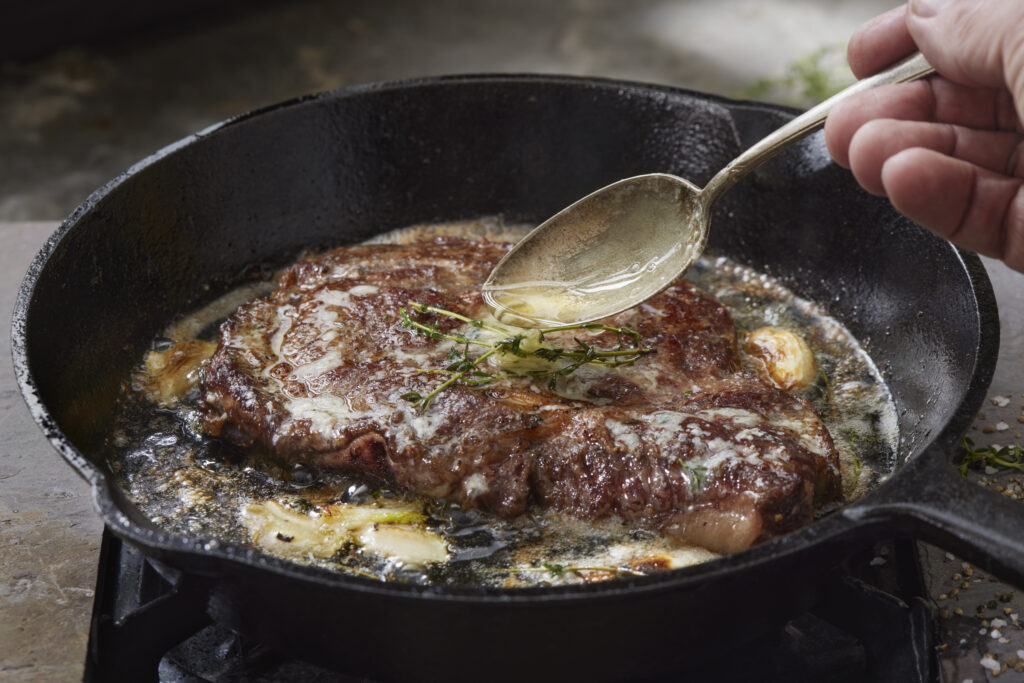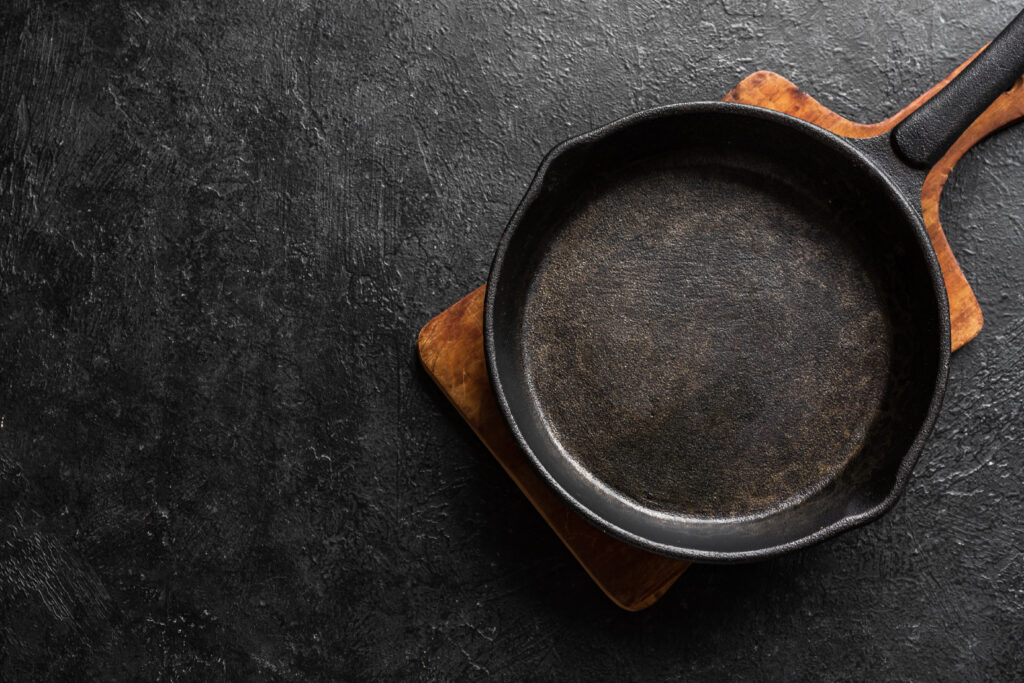A cast iron skillet is one of my favorite kitchen tools. They’re prized for their durability, heat retention, and ability to develop a naturally non-stick non-toxic surface over time. I recently was in Sevierville, TN and got to take a trip to the Lodge factory store there and do some shopping. This location has an entire section of what they call “seconds” – slightly imperfect/flawed cast-iron skillets, pots, griddles, etc. I could have bought so many things there! One of the cast iron skillets that I bought is a mini skillet that I use every single morning for eggs 🙂
To maintain your cast iron skillet’s functionality and extend its lifespan, proper care and maintenance are very important. Here are a few tips to help keep your cast iron skillet clean and seasoned. and rust-free.

Seasoning the Skillet
- Seasoning is a critical step in maintaining a cast iron skillet. Seasoning is the process of coating the skillet with a layer of oil and then heating it to create a polymerized, non-stick surface. This protective layer helps prevent rust and improves the cooking performance of the skillet.
- To season a cast iron skillet, start by cleaning the pan thoroughly to remove any residue or rust. If your skillet is new or needs re-seasoning, apply a thin layer of a high-smoke-point oil to the entire surface, including the handle. I typically use avocado oil – I’ve found it to be the most effective for my cast-iron. Be sure to wipe off any excess oil with a paper towel to avoid a sticky finish. Next, place the skillet upside down in an oven preheated to around 450°F (230°C), with a sheet of aluminum foil on the lower rack to catch any drips. Bake the skillet for about one hour, then turn off the oven and allow the pan to cool completely before removing it. Repeat this process two to three times to build up a strong seasoning layer. This is a very important step when trying to maintain the life of your cast iron skillet!
Cleaning the Skillet
- Proper cleaning is one of the most important aspects of cast iron care! Unlike other cookware, you should avoid using soap or harsh detergents, as these can strip the seasoning layer.
- After each use, allow the skillet to cool slightly before rinsing it with warm water. If necessary, use a stiff brush or a non-abrasive sponge to scrub off food particles. This is the metal sponge I have been using for years on mine. For stuck-on bits, use a bit of coarse salt mixed with water to create a scrubbing paste. The salt works as a gentle abrasive that cleans but doesn’t damage the seasoning. Avoid soaking the skillet in water, as prolonged exposure to moisture can lead to rust. If your skillet does rust, you can remove the rust by scrubbing it with steel wool, then re-season the pan.
- Dry the skillet immediately with a towel to prevent any water droplets from causing rust. I typically turn a burner on low and set my skillet on the stove for a few minutes to make sure every drop of water is removed from the pan. After it’s dry, turn the burner off and let the pan sit and cool before putting it away.
- After cleaning, it is important to add a light coating of oil to the skillet before storing it. This will help preserve the seasoning and prevent rust. Simply rub a small amount of oil into the surface with a paper towel, ensuring an even coat.

Preventing Rust
- Rust is the biggest threat to cast iron cookware, but it can be easily prevented with proper care. As mentioned, drying your skillet immediately after cleaning is essential. If you do notice rust spots, don’t panic!! Simply scrub the rusty areas with steel wool, wash and dry the skillet, then re-season it. Re-seasoning helps restore the protective layer and ensures that the skillet will function properly once again.
Storage
- Storing your cast iron skillet correctly is essential to prolong its lifespan. After cleaning and oiling the skillet, store it in a dry, cool place. Some people recommend placing a paper towel or cloth between the skillet and its lid or other cookware to absorb moisture and prevent scratching. Avoid stacking heavy items on top of your cast iron to prevent any damage to the surface.
- If you are storing the skillet for an extended period, it’s a good idea to lightly re-oil the pan before putting it away to maintain its seasoning and keep it protected from rust.

Using a Cast Iron Skillet
- To get the most out of your cast iron skillet, it’s important to use it regularly. Cast iron pans improve with age, and the more you use them, the better the seasoning becomes. When cooking, avoid using acidic foods like tomatoes during the first few uses, as they can break down the seasoning layer. Over time, your skillet will develop a rich, dark patina that enhances its non-stick properties and flavor profile. I use my cast iron every day at least once and it has developed a beautiful finish!
What are the health benefits of cooking with cast iron?
Cooking with cast iron offers several health benefits! Unlike non-stick cookware, cast iron adds small amounts of iron to your food, which can help boost your iron intake – especially important for those who are pregnant or those with iron deficiencies. The natural seasoning on cast iron also creates a non-toxic, chemical-free cooking surface, avoiding harmful substances often found in synthetic coatings on pans advertised as “non-stick”. Additionally, cast iron’s excellent heat retention allows for more even cooking, which can help preserve the nutrients in your food. Overall, using cast iron is a healthy and safe choice for both cooking AND nutrition.

Caring for a cast iron skillet may seem like a lot of effort, but the benefits far outweigh the work. With proper seasoning, cleaning, and storage, your skillet can last for generations, providing you with an unbeatable cooking surface for years to come. By following these helpful tips, you’ll not only ensure that your skillet stays in pristine condition, but you’ll also enhance your cooking experience, making each meal more enjoyable. I just love cooking on my cast iron skillets!

